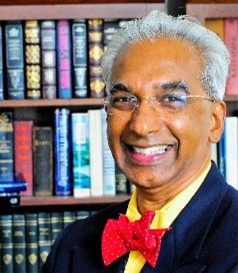- Highlights of 2024



Madhu Thangavelu conducts the ASTE 527 graduate Space Exploration Architectures Concept Synthesis Studio in the Department of Astronautical Engineering within the Viterbi School of Engineering at the University of Southern California. He also teaches the Arch599 Extreme Environment Habitation Design Seminar in the School of Architecture, where he is a graduate thesis adviser. Mr.Thangavelu’s educational background is in Architecture(Masters in Building Science, USC School of Architecture 1989) and in Engineering(Bachelors in Science and Engineering, National Institute of Technology, Calicut, India, 1980). He is also a graduate of the inaugural summer session of the International Space University held at MIT in 1988. Versions of Madhu's masters thesis(conceived during ISU '88 at MIT)entitled "MALEO: Modular Assembly in Low Earth Orbit. An Alternate Strategy for Lunar Base Establishment" were published in several journals worldwide. At USC, he was mentored by and worked as a research assistant and research associate under Prof..Eberhardt Rechtin, professor of Electrical, Systems and Aerospace Engineering,(while he was creating the Systems Architecting Engineering program at USC), considered the chief architect of NASA’s Deep Space Network and President Emeritus of Aerospace Corp. Madhu is a co-author of the book "The Moon: Resources, Future Development and Colonization", John Wiley &Sons 1999, and the second Springer/Praxis edition was published in 2007, third edition in preparation. He is a former Vice Chairman for Education, Los Angeles Section of the American Institute Of Aeronautics and Astronautics(AIAA). He has directed Space Exploration Projects at the California Institute of Earth Art and Architecture. Mr. Thangavelu is also the invited author of the chapter “Living On the Moon” in the Encyclopedia of Aerospace Engineering, a major reference work published by John Wiley and Sons in October 2010, updated in 2012. He was on the team that won the coveted NASA NIAC Phase 1 and 2 awards consecutively for developing robotic building technologies on the Moon and Mars. Mr. Thangavelu’s concept creation work was greatly appreciated for proposing ideas that pointed to the “leading-edge sensor concept” for return to flight of the space shuttle fleet. Mr.Thangavelu is on the faculty of the International Space University, an international organization that offers advanced interdisciplinary, intercultural and international training for promising leaders and space professionals. He is the North American coordinator for the International Moon Village Association based in Vienna, Austria. Madhu is on the Board of Directors of the National Space Society(NSS) and also the NSS Vice President and Liaison for NSS India region.